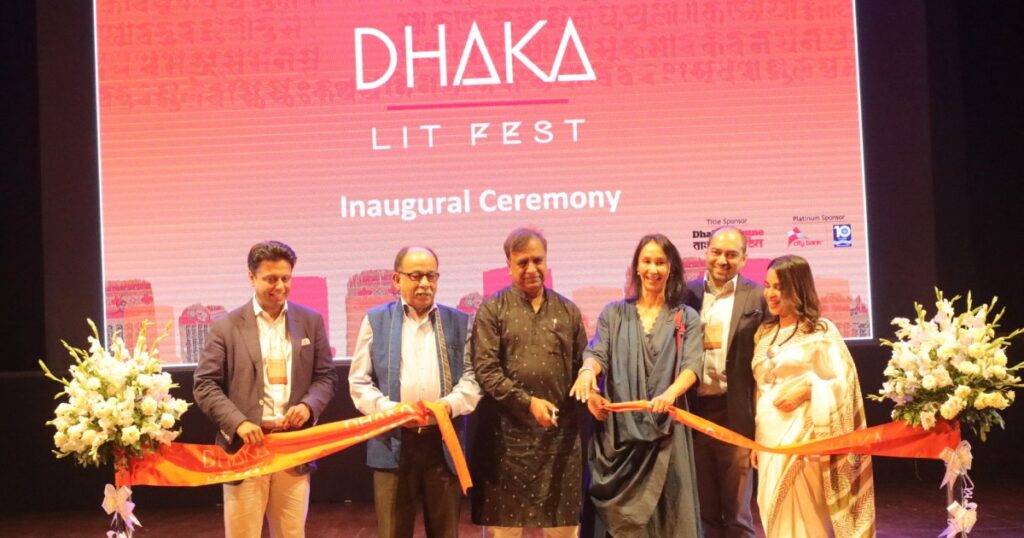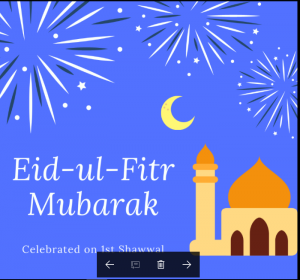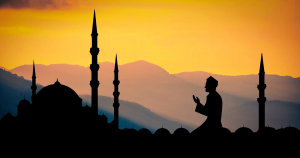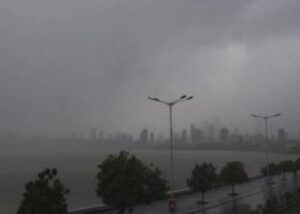Dhaka Nov 08 – Fast emerging as a counterpart to February’s Amar Ekushey Book Fair, the Dhaka Literature Festival draws book lovers in the latter part of the year, with its notably more international participation. As such, it is carving out a place for itself in the social calendar as an event that attempts to connect the written words, poetic rhythms and human emotions that find expression in the country’s literature to a wider swathe of humanity.
The ninth edition of the Dhaka Lit Fest (DLF) was inaugurated at Bangla Academy’s Abdul Karim Shahitya Bisharad Auditorium Thursday.
Cultural Affairs Minister KM Khalid opened the festival around 11:30 am. Internationally acclaimed Bangladeshi-born British novelist Monica Ali was also present at the inauguration, along with Bangla Academy director Habibullah Sirajee and the event directors.
“When the fest first started as the Hay Festival back in 2011, its principle was to promote global literature to the Bangladeshi audience. Now, as the Dhaka Lit Fest, it is simultaneously and successfully presenting Bengali Literature to the global audience with the presence of enthusiasts from five continents and 18 countries who are attending the fest in the upcoming three days. This is undoubtedly a glorious event for us,” Khalid said.
Praising the initiative and efforts of the hosts, he said the government is always ready to extend support to events like this.
The minister promised to provide special support to DLF-10 next year, which is going to be themed and dedicated to Father of the Nation Bangabandhu Sheikh Mujibur Rahman.
DLF 2019’s Director and Producer Sadaf Saaz said the festival is covering all genres in both Bengali and English language from poetry to fiction and philosophy to science in order to fulfil its commitment to the society and also to secure a better literary future for the generation.
The two other co-directors of the event, K Anis Ahmed and Ahsan Akbar, also spoke on the occasion. The directors also mentioned that the event is going to have a special focus on indigenous languages, as UNESCO has marked 2019 as the year of Indigenous Language Protection.
Monica Ali, the special guest, thanked the organisers for hosting such an extraordinary event on literature.
Jam-packed sessions
Shortly after the inauguration, five prolific female writers including Monica Ali graced the AKSB auditorium to engage in a thought-provoking discussion on contemporary literature and reflection of women in fiction.
Titled ‘Fiction: Resistance or Refuge’ the session had Sumana Roy, Monica Ali, Maria Filomena Bouissou Lepecki, Yara Rodrigues Fowler, and Minna Lindgren on stage.
Brazilian novelist Maria Filomena Bouissou Lepecki said that writing fiction is similar to diving deep in human experience. “Through fictions, we can produce and reflect reality,” she said.
About the issue of categorising fictions based on gender, she said such practice should not be done in the literature. “Personally, I think there shouldn’t be any category named women writer,” Maria said at the event.
British-Brazilian author Yara Rodrigues Fowler expressed her view on writing for an audience. “You can always write for the people who don’t read you especially the marginalised community,” according to Yara.
Sumana Roy, the author of How I Became a Tree, highlighted how female writers are seemingly secluded not for their skill or writing topics but because of their gender.
Award-winning Finish author Minna Lindgren spoke about using humour as a tool to engage the readers. She said- “My books are humorous…I want to seduce them (readers) with humour and then hit them with serious issues.”
Monica Ali, whose debut novel Brick Lane was highlighted for the Man Booker Prize, paid regard to the power wielded by writers. “There is a power to story-telling, the writer should use it responsibly,” Monica expressed her view. She further mentioned that her writing is a way to address social issues and also expressed that she wants to write for television after finishing her current project.
On the sprawling lawn of Bangla Academy, another important discussion on translation in literature titled ‘Bhashar Bondhon Bhenge Bhashyer Shondhane’ took place where Arunava Sinha, Anjum Katyal, Khaedmul Islam, Rafique-Um-Munir Chowdhury and Mashrur Arefin expressed views on contemporary works and the ethics of translation literature with the excellent Alam Khorshed as moderator.
Arunava Sinha, about his style of translation, said “I’m led by the text while translating.” He also remarked that there is little freedom for the translator to express his own take on the original literature but that should be done masterfully nevertheless. “It’s similar to walking on a tightrope,” he said.
Anjum Katyal mentioned that there should be a strong connection with the literature and the one who is translating. “You’ve to submit…you’ve to surrender yourself to the text,” she said. She also spoke about being faithful to the original verses from the ethical ground.
Rafique-Um-Munir Chowdhury said there is no ‘final word’ in translation literature. He also highlighted the importance of this sector of writing saying, “There is no alternative of translation to know others and express ourselves.”
Mashrur Arefin noted that the translator in any language must remain leaned to literal translation in order to do justice to the original author. He furthered, “It is expected that one should try to translate literally to express what the author originally meant.”
In the AKSB auditorium afternoon, one of the most prestigious awards for young writers of the country, the Gemcon Young Literature Award was announced. Kolkata-based writer Avishek Sarker and Bangladeshi poet Rafiquzzaman Rony won the Gemcon Young Literature Award 2019 and Gemcon Young Poetry Award 2019 respectively at Dhaka Lit Fest. Each received crest and Tk 100,000.
Rafiquzzaman Rony said, “I’m overwhelmed and speechless. I thank the hosts and the jury for choosing me.”Avishek Sarker said, “I am honoured to receive such a prestigious prize.”
They won the awards for their manuscripts, “Nishiddha” and “Dhoashar Tamate Rong”.
The jury board included poet Sajjad Sharif, poet Mridul Dasgupta, poet Kumar Chakraborty, Professor Mostak Ahmed and writer Papri Rahman.
Franz Kafka was a great German novelist who is and always will be remembered for his novella ‘The Metamorphosis’- a widely read and admired piece of literature that opened the window to many, regarding the possibility of virtual or alternative reality. DLF and Goethe-Institut Bangladesh tried to address the possibilities in the session titled ‘Metamorphosis’ with plenary speaker Jan Tompkins and moderator Minhaz-Us-Salakeen Fahme.
The afternoon and sunset was celebrated in a jovial way at the AKSB auditorium through acknowledging the achievement of renowned Bangladeshi lyricist and journalist Zulfiqer Russell. His lyrical poem collection “Joler Daame”s the first volume was unveiled with the presence of celebrated Bangladeshi music artists including Mohammad Rafiquzzaman, Bappa Mazumder, Fahmida Nabi, Monir Zaman, Nakib Khan and Samina Chowdhury. The session was moderated by renowned journalist Munni Saha.
Continuing the celebratory discussion of glorious careers, DLF-2019’s first day wrapped up with the session “Memorable moments: My Life in Theatre” where celebrated actor and beloved politician Asaduzzaman Noor shared glimpses of his majestic journey with the audiences. Along with the session’s moderator Samina Luthfa, Noor addressed and discussed every road of his lifelong journey as a theatre activist, a popular actor, a people’s own in the parliament from the common ground- or simply just as a senior scholar with loving advice

and wishful thoughts for the generation’s prosperous and happy, healthy future. He also tantalized the audiences with two of his amazing recitations in the end.
The eventful premier day of this year’s Dhaka Lit Fest also observed some other noteworthy events including interactive speech sessions such as ‘Babu Bangladeshi’, Rachel Dwyer’s session ‘How Bollywood is a lens to modern India’, ‘Abdullah the Cossack’ by HM Naqvi and Khademul Islam, ‘The Storyteller’ with Jan Blake and Teresa Albor, “It’s Personal” by Shahnaz Huda and UM Habibun Nessa with Faustina Pereira, “Golper Nosshworota” by Altaf Shahnewaz, Mahbub Aziz, Alim Azij, Masud Hasan and Obayed Akash with Firoz Ahmed, “Nirob Itihash, Shorob Shahittyo” by Jahar Sen Majumder, Bishwajit Ghose and Mostak Ahamed with Muhammad Muhsin and Ruma Modhok, Sukumar Barua’s “Nijer Kotha O Documentary”, ‘History and philosophy of science’ by Piers Bursill-Hall with Salahdin Imam, Children’s events ‘Wereworld & Max Helsing: The teenager’s guide to horror and fantasy!’ and ‘Play with Words’ (for 10-12 years)
Along with all these events, several recitations were also held at the event throughout the day including Australian Poetry Slam champion poet and educator-motivational speaker Zohab Zee Khan’s Poetry Recitation, Fawaz Rob’s presentation ‘Dhaka, I Love You’, Two different recitations on Bangabandhu, “Kabita Adda: Epar Opar” by Mridul Dasgupta, Ruby Rahman, Jahar Sen Majumder, Kamal Chowdhury, Goutam Guha Roy and Mohammad Sadik with Habibullah Sirajee, and two performances from inside and outside of Bangladesh- ‘Broadside Ballads’ by Jennifer Reid in the afternoon and ‘Maizbhandari’ from Bangladesh, in the evening.
With an action-packed Friday ahead, the first day of DLF seemed promising to offer more exciting sessions on its Day 2. The detailed schedule is available on the official website of Dhaka Lit Fest – 2019. – UNB




